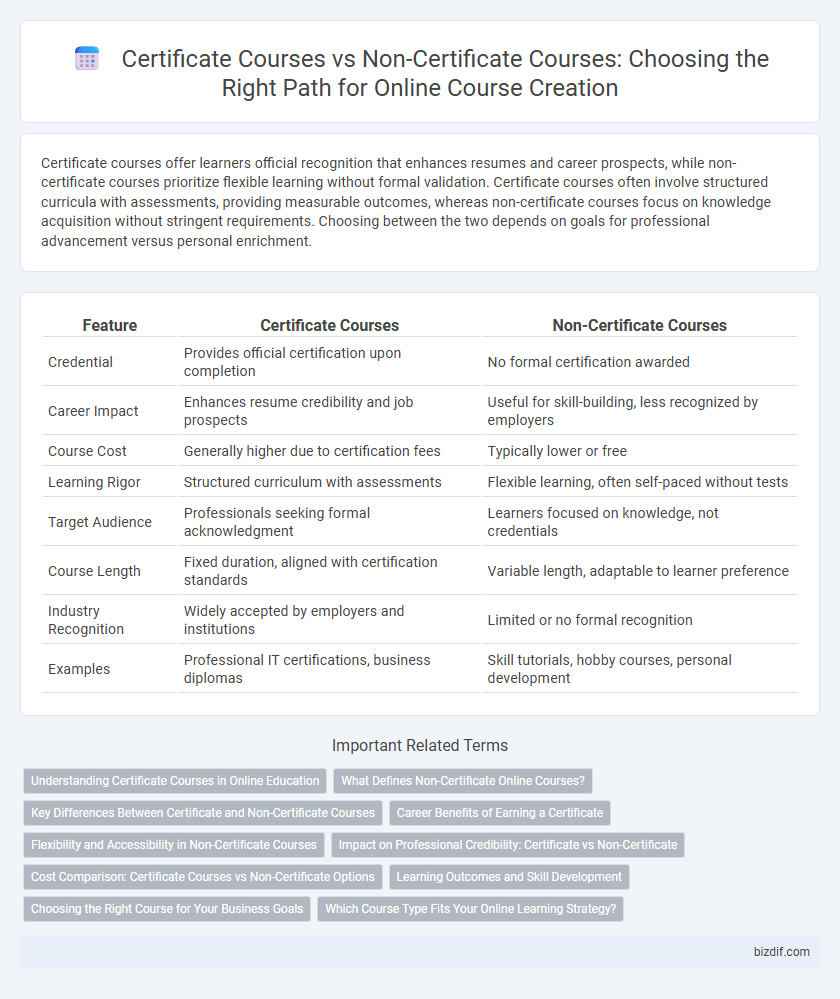Certificate courses offer learners official recognition that enhances resumes and career prospects, while non-certificate courses prioritize flexible learning without formal validation. Certificate courses often involve structured curricula with assessments, providing measurable outcomes, whereas non-certificate courses focus on knowledge acquisition without stringent requirements. Choosing between the two depends on goals for professional advancement versus personal enrichment.
Table of Comparison
| Feature | Certificate Courses | Non-Certificate Courses |
|---|---|---|
| Credential | Provides official certification upon completion | No formal certification awarded |
| Career Impact | Enhances resume credibility and job prospects | Useful for skill-building, less recognized by employers |
| Course Cost | Generally higher due to certification fees | Typically lower or free |
| Learning Rigor | Structured curriculum with assessments | Flexible learning, often self-paced without tests |
| Target Audience | Professionals seeking formal acknowledgment | Learners focused on knowledge, not credentials |
| Course Length | Fixed duration, aligned with certification standards | Variable length, adaptable to learner preference |
| Industry Recognition | Widely accepted by employers and institutions | Limited or no formal recognition |
| Examples | Professional IT certifications, business diplomas | Skill tutorials, hobby courses, personal development |
Understanding Certificate Courses in Online Education
Certificate courses in online education provide learners with formal recognition and validated credentials upon completion, enhancing job prospects and professional credibility. These courses often feature structured curricula, assessments, and industry-relevant skills tailored for career advancement. Non-certificate courses typically offer flexible, knowledge-driven learning without official accreditation, prioritizing personal development over professional validation.
What Defines Non-Certificate Online Courses?
Non-certificate online courses are educational programs that provide knowledge and skills without issuing an official certification upon completion. These courses prioritize learning flexibility and skill development over formal accreditation, often appealing to learners seeking personal growth or specific competencies. Platforms like Coursera and Udemy offer a wide range of non-certificate courses, enabling users to access content without the commitment required for certification.
Key Differences Between Certificate and Non-Certificate Courses
Certificate courses provide formal recognition upon completion, often enhancing career prospects and professional credibility through validated skills. Non-certificate courses primarily focus on knowledge acquisition without official accreditation, thus appealing to learners seeking personal growth rather than qualification. The distinction lies in the presence of accreditation, which impacts employability and motivation for learners choosing between these online education formats.
Career Benefits of Earning a Certificate
Earning a certificate through online courses significantly enhances career prospects by validating specific skills and knowledge to employers, making candidates more competitive in the job market. Certificate courses often provide industry-recognized credentials that can lead to higher salaries, promotions, and better job opportunities compared to non-certificate courses. These credentials demonstrate a commitment to professional development and continual learning, which are highly valued in many industries.
Flexibility and Accessibility in Non-Certificate Courses
Non-certificate courses offer greater flexibility by allowing learners to access content at their own pace without the constraints of deadlines or formal assessments. These courses enhance accessibility for diverse audiences, including professionals balancing work commitments and individuals in remote locations with limited internet access. The absence of certification requirements removes barriers, enabling continuous skill development and lifelong learning opportunities.
Impact on Professional Credibility: Certificate vs Non-Certificate
Certificate courses enhance professional credibility by providing verifiable proof of skill acquisition recognized by employers and industry standards. Non-certificate courses may offer valuable knowledge but often lack formal acknowledgment, which can limit their impact on career advancement. Employers typically prioritize candidates with certified credentials for roles requiring validated expertise and commitment.
Cost Comparison: Certificate Courses vs Non-Certificate Options
Certificate courses typically involve higher fees due to accreditation, assessment, and certification processes, offering learners formal recognition of their skills. Non-certificate courses generally cost less, as they lack official validation and focus primarily on knowledge acquisition without credentialing. Choosing between the two depends on budget constraints and the learner's goal for professional certification or personal enrichment.
Learning Outcomes and Skill Development
Certificate courses offer structured learning outcomes with clearly defined competencies that validate skill development, providing learners with recognized credentials for career advancement. Non-certificate courses emphasize practical knowledge and foundational understanding without formal accreditation, allowing flexible, self-paced skill acquisition. Both formats support diverse learning preferences but differ significantly in credential value and professional recognition.
Choosing the Right Course for Your Business Goals
Certificate courses provide formal recognition and can enhance credibility for professionals seeking skill validation, making them ideal for businesses aiming to improve employee qualifications and market reputation. Non-certificate courses often offer flexible, budget-friendly learning paths suitable for rapid skill acquisition or exploratory training without the need for official credentials. Selecting between certificate and non-certificate courses depends on your company's strategic goals, desired outcomes, and investment in workforce development.
Which Course Type Fits Your Online Learning Strategy?
Certificate courses provide formal recognition and enhance professional credibility, making them ideal for learners seeking career advancement or skill validation. Non-certificate courses offer flexible, often more affordable options geared towards personal growth and exploratory learning without the pressure of formal assessment. Choosing between these course types depends on your goals: prioritize certificate courses for structured, career-focused outcomes and non-certificate courses for flexible, interest-driven education.
Certificate courses vs Non-certificate courses Infographic

 bizdif.com
bizdif.com